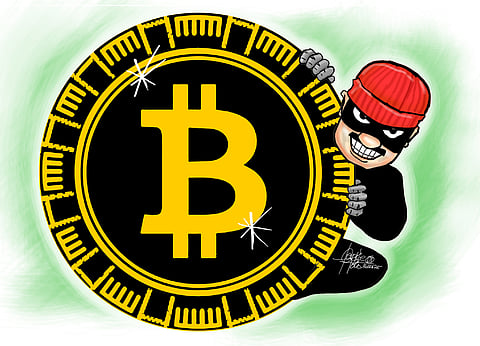
- NEWS
- the EDIT
- COMMENTARY
- BUSINESS
- LIFE
- SHOW
- ACTION
- GLOBAL GOALS
- SNAPS
- DYARYO TIRADA
- MORE

The Securities and Exchange Commission (SEC) has once again raised the red flag against the shiny new gods of finance: cryptocurrency platforms. Blofin, CoinW, DigiFinex, LBank, Pionex — the names sound like brands of vitamin supplements or fancy bottled water, except they promise not hydration or health but instant riches. They also promise, more than likely, heartbreak and financial ruin.
These latest suspects join a longer rogues’ gallery — OKX, Bybit, KuCoin, Kraken, Binance, and company — that have been wooing Filipinos with offers to register via local mobile numbers, deposit their pesos via banks and e-wallets, and start “trading” in the borderless realm of digital assets.
The SEC says those platforms are unregistered, which means they have no license to operate here, no compliance with capital requirements, no supervision, and no accountability. Which also means that if a Filipino uses any of the platforms and loses his shirt, or more to the point, his life savings, then he cannot call anyone for help.
In a country where financial literacy is measured in single digits, that is perilous. It is one thing for a hedge fund manager in New York to gamble on “perpetual futures,” quite another for a tricycle driver in Cavite to put his P20,000 into a platform that may vanish overnight. And vanish they do.
Have you heard of FTX? At its peak, it was the second largest exchange in the world, endorsed by celebrities and trusted by millions. In 2022, it collapsed like a house of cards, billions lost, its founder now serving 25 years for fraud. If that could happen to FTX, what more to platforms that cannot even pass the SEC’s most basic muster?
And even if the platforms themselves don’t implode, hackers may cause them to collapse. Chainalysis has counted $2.2 billion stolen in 2024, and another $2.17 billion in just the first half of 2025. Hacking is not the exception in crypto — it is the norm.
Add to that the inherent volatility: Bitcoin up 10 percent one day, down 20 percent the next. Stablecoins that proved not so stable, like TerraUSD and LUNA in 2022, wiping out $50 billion in value in a week. These are not investments, but roulette tables with digital chips.
The SEC warns of total loss, identity theft, market manipulation and even exposure to money laundering and terrorist financing. And yet many Filipinos still dive in. Why? Because poverty makes us desperate, and desperation makes us gullible. A platform flashes on TikTok promising double-your-money schemes, and we pounce. We forget that the only thing multiplying is the list of victims.
And there’s the status symbol of dabbling in something mysterious.
Sure, the SEC can issue advisories, block websites, and even drag operators to court. But at the end of the day, it cannot block our illusions. The illusion that there is a shortcut to wealth, that we can escape the grind by betting on tokens whose value we barely understand.
Cryptocurrency, like fire, is not inherently evil. But give it to children — or to a citizenry without proper shields — and it burns the house down. The SEC is right: until platforms meet Philippine laws, until they prove they can be held accountable, it’s best to stay away. There are enough scams in this country without importing new ones wrapped in code and glitter.
You want to play with crypto? Fine. But know that in the Philippines, on unregistered platforms, you’re not just dabbling, you’re playing with fire. Is it a coincidence that crypto sounds a lot like klepto?
